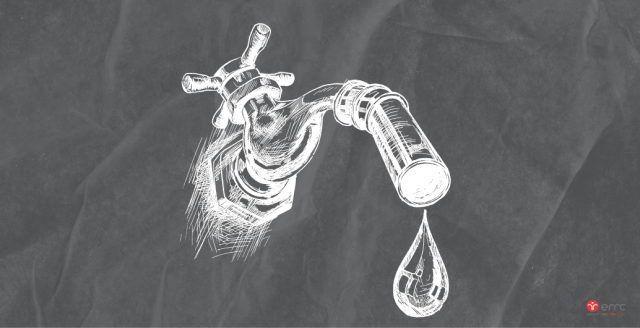No Water, No Sanitation, No Justice: The Fight to Get the Taps Running for Roma in Tenekje Maalo
05 September 2023

For nearly 50 years, the Romani community living in the informal neighbourhood of Tenekje Maalo (Тенеќе Маало) in Kavadarci, North Macedonia have been living without legal access to drinking water, sanitation, or a clean environment. The community of over 300 people, the majority of which are children, have never had a connection to the municipal water mains, meaning none of their homes have a safe water source or sewerage provision. This is because of antigypsyism; the Municipality claims it is not possible to connect them as the neighbourhood is illegally constructed, despite agreements with an electricity provider (EVN Macedonia) proving this is not the case, and despite the Municipality offering no other legal option.
In April 2022, the Equality Body issued an Opinion finding direct discrimination based on ethnic affiliation, belonging to a marginalised group, social background, and property status in the area of access to public goods and services committed by the Muncipality of Kavadarci against the Romani community living in Tenekje Maalo. The resulting recommendations were that the Municipality ensures access to clean water, sanitation, and clean environment for the neighbourhood. The Equality Body also recommended that in case of legal impediments concerning the legalisation of the neighbourhood, an interim solution should be found to ensure access to water to all residents’ homes. The Municipality were given a 6-month deadline to implement these recommendations.
In the meantime, in July 2022, the ERRC submitted an actio popularis complaint before the Basic Court Kavardarci concerning the lack of access to water and public services. Eventually, a week before the 6-month deadline, the Municipality provided a plastic water tank containing one cubic metre of water and two waste containers to Tenekje Maalo; a quick fix to make up for years of environmental injustice faced by the Romani community there.
Now, over a year later, the Basic Court Kavadarci has issued a judgment rejecting the ERRC’s actio popularis complaint. A field visit carried out by the Court showed that some households were connected to an unofficial water source of unknown quality, and that the plastic water tank had been stolen by unknown persons. This was seemingly enough for the Court to conclude the case, finding no discrimination. In the Court’s view, not only did the authorities not discriminate against the Romani community but in fact the community was “privileged” to have been provided with access to water, in the form of the water tank, despite living in illegal, informal housing. The ERRC strongly believes that this judgment fails to properly administer justice for the community.
Even more disappointing is the apparent lack of awareness of environmental racism shown by the Basic Court Kavadarci. When no legal options are available, it seems inevitable to us at the ERRC that communities will resort to illegal water connections to provide drinking water for their families. We are also aware that the water from these illegal connections is often unsafe and contaminated, raising serious concerns about people’s health and safety. The Roma living at Tenekje Maalo are forced to use illegal, potentially unsafe water sources because they have not been provided with any other option by the authorities. This is the result of antigypsyism. This is what the Basic Court Kavadarci has failed to take into account, and this is why the ERRC (represented by attorney-in-law Blagoja Pandovski) filed an appeal against the judgment with the Court of Appeal Skopje on 30th August 2023.
At the ERRC we are used to domestic courts not understanding international human rights standards, which is why we are always fully prepared to take cases all the way to the European Court of Human Rights to get justice for Romani victims of antigypsyism. We believe that the Romani community at Tenekje Maalo deserve access to safe drinking water, to a clean environment, and to fair and equal treatment. We will push for justice for them and work towards a long-term solution that addresses the underlying issues of environmental racism, poverty, and discrimination that have led to this situation.




